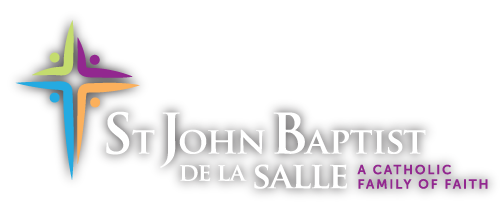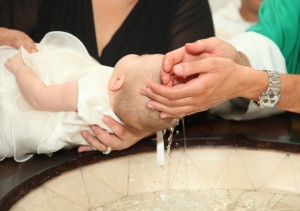St. John’s would like to welcome your newest family member to our Family of Faith.
Baptism is a precious gift given by God through the Church. Baptism is the gift of new life, the eternal life of the risen Christ. This gift is a sacrament, an encounter with Christ himself. Your decision to bring your child to be baptized brings the entire Family of Faith at St. John’s great delight!
Please take time to read and reflect on the two attachments: Awaiting the Birth of Your Child and Baptism Is a Gift
The Sacrament of Baptism is celebrated on the second Sunday of the month. Parents requesting Baptism for their child must attend our Baptismal Prep Program which is scheduled every month. Contact the Office three months prior to the date of Baptism
Please call the parish office to register for the Baptismal Prep Program at: 610.777.1697.
Parish Policies for Baptism / Confirmation Sponsor Certificate
Many of our parishioners request Certificates of Eligibility to act as Godparents at a Baptism or Sponsors for those receiving Confirmation. This is a great honor to be asked to do so.
It means that the young person or his/her parents, recognize you as someone who is an active and regular participant in the practice of the Catholic faith, and is willing and able to help pass on the faith to a young person.
In order for our Pastor to prepare such a certificate on your behalf, we ask that parishioners review and complete this form.
Please note, that only those who are registered (for at least 3 months) and are known in the parish, actively participating in it’s life, and if married, are in a valid, sacramental marriage, and is in regular attendance at Mass and support of the parish may apply. Anonymous parishioners and donors cannot be verified. Simply “being” a Catholic is not enough to serve in this important capacity. We strictly adhere to this policy.
*** Anyone requesting a Sponsor Certificate, must submit the form / request at least one month in advance of the proposed Sacramental date.***
Should you have any questions, please call the Parish Office at 610.777.1697 or email: st.jbdls@verizon.net
The raising of children in the knowledge and practice of our Catholic faith is such an important part of the responsibility for parents and guardian. The sacraments of Baptism and Confirmation have an added dimension as parents are asked to select sponsors (godparents) for their children who are about to be initiated into the Catholic faith.
There is no more lively discussion and some times angered/confused responses, when the “Nominee” for this important role as sponsor, is advised that “they do not qualify” for this important role. Perhaps the following brief essay, which examines the historical, legal and pastoral aspects of serving as sponsor may help.
Historical
The role of the godparent for baptism is rooted in the role of the sponsor in the Catechumenate, which originated in the early Church. Recall that until the year 313, the Church was under the persecution of the Roman Empire and had to be cautious in conducting its affairs so as to prevent pagan infiltration and persecution. Also, until the Middle Ages, the Sacraments of Initiation – Baptism, Eucharist and Confirmation – were all administered at the same time.
The role of the sponsor then was to attest to the integrity of the person, oftentimes an adult, seeking admission into the Church as well as to assist him/her during the catechumenate in preparing for these sacraments and in living a Christian life. For infants, these sponsors would also make the Profession of faith in the child’s name and accept the responsibility of instructing the child in the faith, especially if the parents failed in this duty.
About the year 800 when infant baptism was truly the norm, these sponsors were called “Patrinus” or “Godfather.” Traditionally, we identify the sponsor of a child for baptism as the godparent – godmother or godfather, but the technical term remains “Sponsor.”
Legal
According to the Code of Cano Law, “Insofar as possible, one to be baptized is to be given a sponsor who is to assist an adult in Christian initiation, or, together with the parents, to present an infant at the baptism, and who will help the baptized to lead a Christian life in harmony with baptism, and to fulfill faithfully the obligations connected with it” (No. 872) This statement clearly reflects the historical roots of the role of sponsor.
To be a sponsor, a person must be chosen by the person to be baptized, or by the parents or guardians of a child, or, in their absence, by the pastor or minister of the sacrament. The sponsor must not only have the intention of being a sponsor but also meet proper qualifications. The sponsor must have completed their sixteenth year. He/she must be a Catholic who has received the sacraments of Holy Eucharist and Confirmation, and leads a life in harmony with the faith and the role to be undertaken. Moreover, the sponsor cannot be impeded by some canonical penalty. Ideally, this sponsor at Baptism should also be the sponsor for Confirmation. Note that the mother and father of the child cannot serve as sponsors. Also note, that these are the same requirements for Confirmation sponsors. (Cf. Code of Cannon Law, No. 874.1)
Strictly speaking, a person only needs one sponsor for baptism – male or female, but may have two sponsors, one male and one female. In the case of emergency, such as imminent death, no sponsor is needed. Technically, only Catholics can be godparents or sponsors. A Christian of another denomination, whether Orthodox or Protestant, however, may be a “Christian witness” to the baptized along with the Catholic godparent. The reason for this distinction and restriction is that the godparent not only is taking responsibility for the religious education and spiritual formation of the baptized person, but is also representing the Church, the community of faith, into which the person is being baptized. A Christian who in not Catholic, although perhaps a very holy Christian, cannot fully attest to the beliefs of the Catholic Church. Likewise, a Catholic can only be a Christian witness for someone who is baptized into another Christian denomination.
Pastoral
Here we should pause to clarify who qualifies as a Catholic godparent. A Catholic who does not practice the faith by regularly attending Mass or who is in an invalid marriage disqualifies him/herself from being a godparent. Moreover, if a person is Catholic but antagonistic to the faith, i.e. has the attitude “I am a Catholic but…,” and would not be a good example and witness to the faith also disqualifies him/herself.
Therefore, parents need to find good practicing Catholics for godparents. Sadly, this task can be very difficult in today’s world, but the burden is on the parents to select the right person, not to challenge the Church’s teaching on the matter.
As a pastor, I am truly perturbed each time someone approaches me to sign a sponsor’s certificate and attest that he/she is a practicing Catholic, when this is in fact not true. Have we come to the point where people will actually demand the priest to lie for them?
Here at St. Johns’, while we are very pastorally sensitive, we seek to give the sacraments their due dignity. Sponsors must fulfill the requirements noted above and actually be registered, support and practice their faith with us. If I do not recognize the person, or he/she is not registered in the parish, or does not attend Mass faithfully, in justice, I cannot meet such a request and sign a form the certifies otherwise.
Parents need to find good practicing Catholics to be godparents. The best place is to look for relatives, even grandparents, who have a blood relationship with the child and have kept the faith over the years. Good friends are also appropriate, but sometimes friendships wane, leaving the godchild without an active godparent.
In all, godparents serve a special role in the life of the baptized person. Therefore, parents should choose a godparent not just because of a blood relationship or friendship; rather, a godparent should be an honest and trustworthy witness of the faith who will help the godchild attain salvation.


